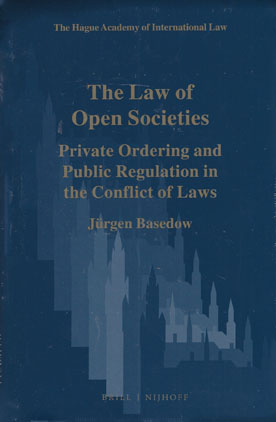
This book endeavours to interpret the development of private international law in light of social change. Since the end of World War II the socio-economic reality of international relations has been characterised by a progressive move from closed to open societies. The dominant feature of our time is the opening of borders for individuals, goods, services, capital and data. It is reflected in the growing importance of ex ante planning – as compared with ex post adjudication – of cross-border relations between individuals and companies. What has ensued is a shift in the forces that shape international relations from states to private actors.
The book focuses on various forms of private ordering for economic and societal relations, and its increasing significance, while also analysing the role of the remaining regulatory powers of the states involved. These changes stand out more distinctly by virtue of the comparative treatment of the law and the long-term perspective employed by the author. The text is a revised and updated version of the lectures given by the author during the 2012 summer courses of the Hague Academy of International Law.